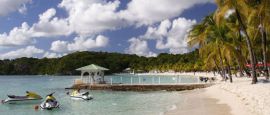Guadeloupe Health Care and Vaccinations
| Title | Special precautions |
|---|---|
| Diphtheria |
Sometimes |
| Hepatitis A |
Yes |
| Malaria |
No |
| Rabies |
Sometimes |
| Tetanus |
Yes |
| Typhoid |
Sometimes |
| Yellow Fever |
No* |
Health care is of a good standard, but health insurance is advisable to cover costs as the reciprocal health agreement between the UK and France may not apply in Guadeloupe. There is a University Hospital Centre in Pointe-à-Pitre, on Grande-Terre, and a hospital on Basse-Terre as well as a number of clinics.
Mains water is chlorinated and whilst relatively safe, may cause mild abdominal upsets. Bottled water is available and is advised for the first few weeks of stay. Drinking water outside main cities and towns may be contaminated and sterilisation is advised. Milk is pasteurised and dairy products are safe for consumption. Local meat, poultry, seafoods and fruit are generally considered safe to eat.
Bilharzia (schistosomiasis) is present; avoid swimming and paddling in fresh water. The sap of the manchineel tree is toxic and causes burns to the skin. Travellers should avoid contact with its leaves and fruit, and should not stand under the tree when it is raining. These trees, which look similar to apple trees, are often marked with a red sign on the trunk.
Do you have any Feedback about this page?
© 2026 Columbus Travel Media Ltd. All rights reserved. No part of this site may be reproduced without our written permission, click here for information on Columbus Content Solutions.








 You know where
You know where